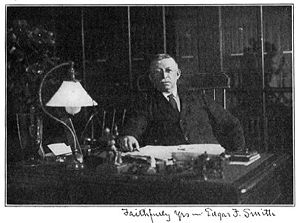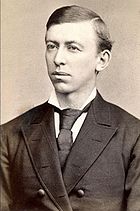
Edgar Fahs Smith
Encyclopedia

United States
The United States of America is a federal constitutional republic comprising fifty states and a federal district...
scientist who is best known today for his interests in the history of chemistry. He accumulated a large collection of pictures, books, and papers related to the history of chemistry, and which today forms the nucleus of the Edgar Fahs Smith Memorial Collection.
Life and work

York, Pennsylvania
York, known as the White Rose City , is a city located in York County, Pennsylvania, United States which is in the South Central region of the state. The population within the city limits was 43,718 at the 2010 census, which was a 7.0% increase from the 2000 count of 40,862...
and earned his college degree at Pennsylvania College at Gettysburg (now Gettysburg College
Gettysburg College
Gettysburg College is a private four-year liberal arts college founded in 1832, in Gettysburg, Pennsylvania, United States, adjacent to the famous battlefield. Its athletic teams are nicknamed the Bullets. Gettysburg College has about 2,700 students, with roughly equal numbers of men and women...
) in 1874. He received his Ph.D. under Friedrich Wöhler
Friedrich Wöhler
Friedrich Wöhler was a German chemist, best known for his synthesis of urea, but also the first to isolate several chemical elements.-Biography:He was born in Eschersheim, which belonged to aau...
in Göttingen
Göttingen
Göttingen is a university town in Lower Saxony, Germany. It is the capital of the district of Göttingen. The Leine river runs through the town. In 2006 the population was 129,686.-General information:...
in 1876. Smith then returned to the United States and, in time, became associated with the University of Pennsylvania
University of Pennsylvania
The University of Pennsylvania is a private, Ivy League university located in Philadelphia, Pennsylvania, United States. Penn is the fourth-oldest institution of higher education in the United States,Penn is the fourth-oldest using the founding dates claimed by each institution...
, first as a professor of chemistry and then as Provost. Smith's scientific research covered the fields of electrochemistry, the determination of atomic weights, and the rare-earth elements.
Smith was a co-founder of the American Chemical Society's History of Chemistry division. He served three times as president of the American Chemical Society
American Chemical Society
The American Chemical Society is a scientific society based in the United States that supports scientific inquiry in the field of chemistry. Founded in 1876 at New York University, the ACS currently has more than 161,000 members at all degree-levels and in all fields of chemistry, chemical...
and was president of the American Philosophical Society
American Philosophical Society
The American Philosophical Society, founded in 1743, and located in Philadelphia, Pa., is an eminent scholarly organization of international reputation, that promotes useful knowledge in the sciences and humanities through excellence in scholarly research, professional meetings, publications,...
(1902–1908) and the History of Science Society (1928). In 1898 Smith was elected to the National Academy of Sciences
United States National Academy of Sciences
The National Academy of Sciences is a corporation in the United States whose members serve pro bono as "advisers to the nation on science, engineering, and medicine." As a national academy, new members of the organization are elected annually by current members, based on their distinguished and...
.
He was awarded the Priestley Medal
Priestley Medal
The Priestley Medal is the highest honor conferred by the American Chemical Society and is awarded for distinguished service in the field of chemistry. Established in 1922, the award is named after Joseph Priestley, the discoverer of oxygen who immigrated to the United States of America in 1794...
in 1926.
Smith died in Philadelphia, Pennsylvania
Philadelphia, Pennsylvania
Philadelphia is the largest city in the Commonwealth of Pennsylvania and the county seat of Philadelphia County, with which it is coterminous. The city is located in the Northeastern United States along the Delaware and Schuylkill rivers. It is the fifth-most-populous city in the United States,...
in 1928.
Books
- Electro-Chemical Analysis (1890; revised 1894, 1902)
- Chemistry in America (1914)
- The Life of Robert Hare (1917)
- James Woodhouse (1918)
- Priestley in America (1920)

